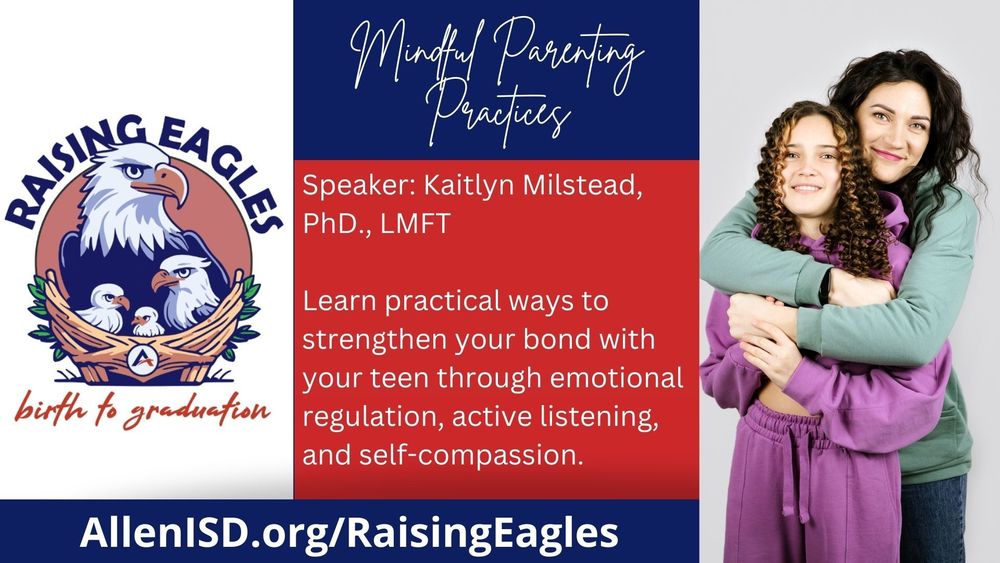In this Raising Eagles session, Community Services partnered with Dr. Kaitlyn Milstead, a therapist who works closely with teenagers and families, to focus on mindful parenting practices. The purpose of the training was to equip parents with practical strategies for building stronger connections with their teens, managing stress, and modeling emotional regulation in the home.
Parents often juggle competing demands while trying to guide teenagers through complex emotional, social, and academic challenges. Mindful parenting offers tools to help parents pause, respond thoughtfully rather than react emotionally, and foster healthier family dynamics.
Why Mindful Parenting Matters
Mindful parenting emphasizes:
- Empathy – creating space for deeper connection with teenagers
- Emotional regulation – learning to calm ourselves so we can guide our kids
- Active listening – hearing what teens mean, not just what they say
- Self-compassion – modeling kindness toward ourselves as well as toward our children
Teens may appear resistant to parental involvement, but research and real-life counseling experience show that they deeply crave connection. They want agency over their choices, but they also want parents who listen, validate, and guide them without judgment.
Understanding Mindfulness
Mindfulness is not just meditation. It’s the practice of being present, focused, and nonjudgmental in the moment.
Examples include:
- Savoring a morning cup of coffee without distractions
- Taking a walk without headphones or screens
- Watching a movie without multitasking
- Pausing during stressful moments to breathe and notice your body’s signals
When practiced regularly, mindfulness:
- Reduces stress
- Improves emotional intelligence
- Strengthens social connection
- Increases resilience and the ability to regulate emotions
What Happens in the Brain
Parenting often triggers stress. Understanding the brain helps parents recognize why reactivity occurs.
- Amygdala (the fire alarm): Alerts us to danger, often exaggerating threats.
- Prefrontal cortex (the smart brain): Handles reasoning, logic, and problem-solving.
The amygdala always responds first. That’s why our first thought is often reactive and defensive. The goal is to pause long enough for the prefrontal cortex to “catch up,” allowing us to respond thoughtfully.
Through mindfulness practice, the prefrontal cortex strengthens, and over time, the brain learns to shift away from knee-jerk reactivity.
Children Do What They See
Children learn emotional regulation from their parents. If a parent consistently reacts angrily, teens mirror that behavior. If a parent can pause, acknowledge emotions, and choose a calm response, teens absorb that pattern.
It’s important to:
- Assess your own stress baseline
- Identify your triggers
- Notice whether you’re functioning from a calm place or constantly operating at an elevated stress level
Parents cannot expect teenagers to regulate themselves better than the adults around them. The responsibility lies with the parent to model self-control, patience, and empathy.
Practical Mindfulness Tools for Parents
The RAIN Method
- Recognize what is happening in your body and emotions
- Allow yourself to feel it without shame
- Investigate why it’s upsetting you on a deeper level
- Nurture yourself by reminding yourself the feeling doesn’t define your identity
Step Away, Don’t Escalate
When emotions rise, taking a 20-minute break is not abandonment, it’s modeling regulation. Make clear when you’ll return so teens know the conversation isn’t being dismissed.
Body Scans
Simple mindfulness exercises like noticing tension, heartbeat, or body temperature help bring awareness back to the present moment.
Unhooking from Negative Thoughts
Replace “I’m a bad parent” with “I didn’t handle that moment how I wanted, but I can try again.” This models resilience for teens.
Lower Overall Stress
Evaluate family schedules. Overbooked teens and exhausted parents struggle to connect. Sleep, exercise, and downtime are not luxuries, they are essential to functioning well.
Active Listening: Do You Know Your Teen?
Parents often only know what their teens do, grades, activities, schedules, but not who their teens are. Active listening opens doors to their inner world.
Core strategies:
- Ask what your teen needs in a conversation: advice, listening, or brainstorming
- Avoid lectures unless safety is at risk
- Use I statements instead of accusations (“I feel frustrated when I’m interrupted” instead of “You’re disrespectful”)
- Connect before correcting
The Role of Self-Compassion
Parents often carry guilt, shame, or frustration about how they handle tough moments. Self-compassion means recognizing imperfection without harsh judgment.
Key elements:
- Self-kindness – offering yourself grace when mistakes happen
- Common humanity – remembering no parent is perfect
- Mindfulness – noticing what triggered your reaction and what external stressors may be influencing you
Modeling self-compassion helps teens develop it for themselves, especially when facing academic or social setbacks.
Building Connection Through Routine
Teenagers thrive on routine even if they resist it. Families can intentionally create points of connection:
- Weekly family dinners or activity nights
- Morning or evening check-ins
- One-on-one time with each parent
- Gratitude practices at dinner or bedtime
- Acts of kindness as a family
Household roles and chores also reinforce shared responsibility and belonging.
Technology and Connection
Phones and screens often interfere with family relationships. Parents set the tone. If adults are glued to their devices, teens will follow suit.
Healthy tech boundaries include:
- No phones during family meals or activities
- Charging phones outside bedrooms at night
- Modeling delayed responses to notifications
- Encouraging face-to-face interactions instead of relying on digital communication
Boundaries, Rules, and Expectations
Effective boundaries are neither chaotic nor rigid, they are consistent but flexible.
Principles:
- Consistency – follow through on consequences every time
- Predictability – teens should know what will happen if they break a rule
- Clarity – state expectations and timelines clearly (“Take out the trash before dinner”)
- Flexibility – occasionally adjust rules when teens have earned trust
Parents should focus on behavior, not character. Avoid labels like “lazy” or “disrespectful.” Instead, describe how behavior impacts you and the family.
Collaborative Problem-Solving
Instead of battles of will, involve teens in solutions:
- Identify both sets of needs (parent and teen)
- Brainstorm solutions together
- Agree on who will do what by when
- Evaluate whether the plan works for everyone
This process helps teens learn empathy, responsibility, and decision-making.
Additional Reminders
- Avoid overscheduling—downtime is critical
- Ask for feedback from your teen on your parenting approach
- Praise effort more than outcomes to foster a growth mindset
- Consider therapy when a teen needs additional support—sometimes they open up more easily to a non-parent adult
Conclusion
Mindful parenting is not about perfection. It’s about awareness, intention, and practice. Parents who learn to regulate themselves create a safe, empathetic environment where teens feel heard and valued. Over time, this builds resilience, strengthens family relationships, and prepares teenagers for adulthood with healthier emotional skills.

